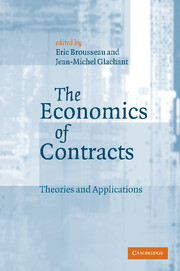Book contents
- Frontmatter
- Contents
- List of figures
- List of tables
- List of contributors
- Acknowledgments
- Part I Introduction
- Part II Contracts, organizations, and institutions
- Part III Law and economics
- 6 The contract as economic trade
- 7 Contract theory and theories of contract regulation
- 8 Economic reasoning and the framing of contract law: sale of an asset of uncertain value
- 9 A transactions-cost approach to the analysis of property rights
- Part IV Theoretical developments: where do we stand?
- Part V Testing contract theories
- Part VI Applied issues: contributions to industrial organization
- Part VII Policy issues: anti-trust and regulation of public utilities
- Bibliography
- Index of names
- Subject index
7 - Contract theory and theories of contract regulation
Published online by Cambridge University Press: 16 January 2010
- Frontmatter
- Contents
- List of figures
- List of tables
- List of contributors
- Acknowledgments
- Part I Introduction
- Part II Contracts, organizations, and institutions
- Part III Law and economics
- 6 The contract as economic trade
- 7 Contract theory and theories of contract regulation
- 8 Economic reasoning and the framing of contract law: sale of an asset of uncertain value
- 9 A transactions-cost approach to the analysis of property rights
- Part IV Theoretical developments: where do we stand?
- Part V Testing contract theories
- Part VI Applied issues: contributions to industrial organization
- Part VII Policy issues: anti-trust and regulation of public utilities
- Bibliography
- Index of names
- Subject index
Summary
Introduction
Discussions of regulation commonly focus on regulating particular industries, such as the airline industry, or regulating types of firms, such as natural monopolies. These discussions often concern the substance of the transactions that regulated firms make. Few regulatory discussions focus on regulating contracts as such. As an example of the distinction just drawn, a regulation discussion may ask what terms a regulated firm can include in its contracts with customers; a discussion of contract regulation may ask what terms the state should supply to firms to use in transactions with each other. In recent years, law and economics scholars have begun to add to the question which contract rule would be appropriate in particular cases the more abstract question regarding how the state should regulate contracts between business firms as a general matter. Contract regulation as a distinct area for scholarly inquiry is in its infancy, however. This chapter's goal is to introduce the subject and to indicate its importance in the hope that more detailed treatments will follow.
An economic theory of contract regulation will have a substantive and an institutional aspect. The substantive aspect asks what the state should do. The institutional aspect asks which legal institutions should perform the needed regulatory tasks. Given the complexity of the subject and the necessary brevity of this chapter, any conclusions respecting these aspects must be tentatively held. With this disclaimer and beginning with substance, the state appears to do four things well: enforce contracts; police the contracting process for fraud and duress; supply parties with common vocabularies to use when writing contracts; and supply parties with governance modes for the conduct of transactions or the resolution of disputes.
- Type
- Chapter
- Information
- The Economics of ContractsTheories and Applications, pp. 116 - 125Publisher: Cambridge University PressPrint publication year: 2002
- 6
- Cited by



